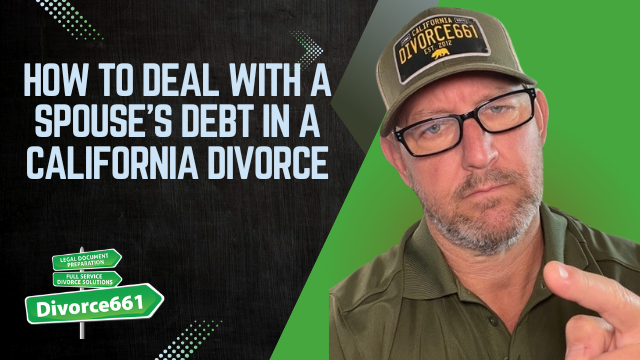How to Deal with a Spouse’s Debt in a California Divorce
Why California community property matters for debt
In California, most debts acquired during marriage are shared. That simple rule can have huge consequences for your financial future. Even if your spouse racked up credit cards or personal loans in their name, you may still be responsible for those debts after a divorce.
How debts are classified
Understanding whether a debt is community or separate is the first step toward protecting yourself. The basic rules are:
- Community debt – Debts incurred during the marriage are generally community obligations, regardless of whose name is on the account.
- Separate debt – Debts incurred before marriage are usually separate, belonging to the person who incurred them.
- Debt tied to separate property – If a debt is secured by or directly connected to separate property, it may remain separate.
Why the timing and purpose of the debt matter
When a debt was taken out and what it was used for both matter. Borrowing to support family living expenses, pay bills, or buy community property will usually be treated as community debt. Debts taken for a spouse’s strictly separate business or as a personal pre-marital obligation may be separate, but those distinctions often require careful documentation and negotiation.
A real example: hidden personal loans and settlement negotiation
Here is a situation I see often. A spouse took out personal loans without the other’s knowledge. The loans were taken before separation, but during the marriage. The case showed that those loans were community debt. Rather than leaving one party saddled with the loans, we negotiated a settlement that offset the community debt against property division to reach a fair result.
“Community debt was negotiated to ensure a fair division.”
That approach balanced the financial burden so neither spouse was left unfairly exposed. It also illustrates why a careful review of all debts and assets is essential before finalizing a judgment.
The importance of the divorce judgment and precise language
A divorce judgment must be written carefully to protect you long term. Vague or incomplete language can leave you exposed to creditors or responsible for obligations you thought were resolved. We always focus on:
- Clearly identifying which debts are community and which are separate
- Documenting agreed offsets between debt and property
- Including precise judgment language that creditors and courts can rely on
Why professional guidance matters
Debt classification and negotiation are nuanced. Small factual differences can change whether a debt is community or separate. Professional help matters because an experienced approach can:
- Accurately review and classify debts
- Develop negotiation strategies to offset debts against property
- Draft judgment language that protects you from future liability
How we help
We specialize in flat-fee divorce services across California with focused expertise in debt and property division. Our services include:
- Reviewing and classifying debts
- Preparing forms and the judgment with careful, protective language
- 100 percent remote filing and support
- Negotiating offsets so community debt does not unfairly burden one party
Our goal is to help you understand what you are really responsible for and to protect your financial future.
Next steps if you are worried about debt in your divorce
If your spouse racked up debt during the marriage and you are concerned about being held responsible, start by gathering documentation for all debts and any evidence showing when and why they were incurred. Then get expert help to:
- Classify each debt as community or separate
- Negotiate fair offsets between debt and property
- Make sure the judgment is written to protect you long term
Free consultation
Worried about debt in your divorce? Visit divorce661.com for a free consultation. By understanding your financial obligations and having the right judgment language, you can safeguard your future.

